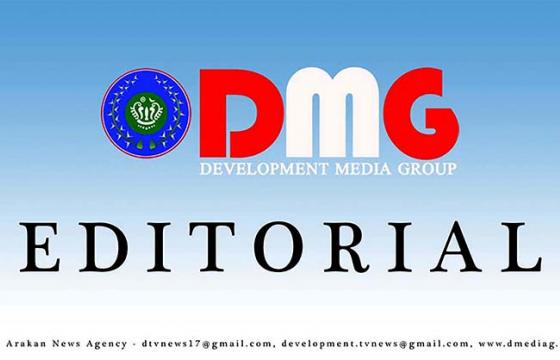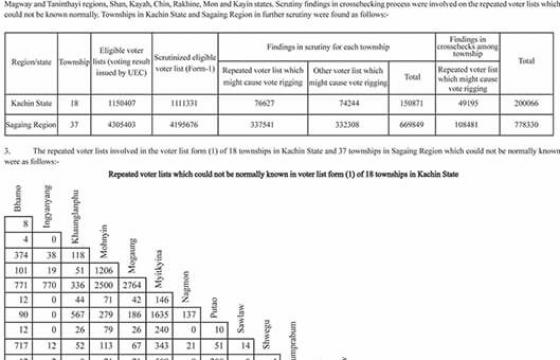Since October 15, 2015, Nationwide Ceasefire Agreement (NCA)-based peace process has been the only game in town. Principally, Ethnic Armed Organizations (EAOs) must sign the NCA before being allowed to participate in what is officially known as the Union Peace Conference – 21st Century Panglong (UPC-21CP), which has been convened twice already, once during the tenure of President Thein Sein and again during the rule of National League for Democracy (NLD) government, under the de facto leadership of Aung San Suu Kyi. The third conference is scheduled to be held on May 24, according to official announcement, following the agreement reached earlier at the Joint Implementation Coordination Meeting between officials of the government and leaders of the armed ethnic organizations that have signed the Nationwide Ceasefire Agreement, in Naypyitaw.
But this is changing fast, as Panghsang, now officially known as Pangkham, capital of the Wa Self-Administrative Division, led the ethnic leadership from 7 EAOs officially declared a non-NCA-based peace negotiation approach on April 19, 2017 that is totally new by rejecting the government-led NCA-based peace process that so far has been the only game in town.
The government insistence that all the EAOs must sign the NCA first or else they would not be allowed to participate in the UPC-21CP have effectively left out all the EAOs participants in Pangkham.
They are the Pangkham-led 7 EAOs military-political alliance that includes the United Wa State Party/Army (UWSP/UWSA), United League of Arakan/Arakan Army (ULA/AA), Kachin Independence Organization/Army (KIO/KIA), Palaung State Liberation Front/Ta’ang National Liberation Army (PSLF/TNLA), Myanmar National Truth and Justice Party/Myanmar National Democratic Alliance Army (MNTJP/MNDAA), Peace and Solidarity Committee/National Democratic Alliance Army (PSC/NDAA) and Shan State Progress Party/Shan State Army (SSPP/SSA).
The alliance recently said to be named Federation of Ethnic Alliance (FEA) held meetings in Pangkham by the UWSP/UWSA for the third time in February 22 to 24 and recent fourth time from April 15 to 19. The Wa also hosted the first Pangkham Summit in May 2015 and the second one in November of the same year.
Although the government is keen to have the UWSA, NDAA and SSPP included in its NCA-based peace process, it is bitterly against the MNDAA, TNLA and AA, it considers that they are relatively new groups that enter the fray without real political motive and unspoken, official attitude that they are directly or indirectly linked to the big neighboring country as proxies, rightly or wrongly.
And to complicate the matter, KIO is involved in the military alliance, which the said excluded 3 EAOs are members, calling itself Northern Alliance – Burma (NA-B) delivering running battles with the government troops, also known as the Military or Tatmadaw, since last year. Apart from that, the KIO is also a leading member of the other 7 EAOs’ military-political alliance, the United Nationalities Federal Council (UNFC).
Like the KIO, SSPP, a militarily formidable group, is also involved in both the Pangkham initiated peace approach which is also a member of the UNFC.
The UNFC is in the process of bargaining with the government on how to make amendment to the present existing NCA so that it could sign the agreement and enter the UPC-21CP as a fully fledged participation group.
Thus, question arises on whether the KIO and SSPP would would follow the Pangkham-initiated or government-initiated NCA-based peace process. However, it should be noted that the UNFC is now only in the process of bargaining to amend the NCA to make it a more equitable setting, which in other words means the creation of a level playing field is still under negotiation.
Against this backdrop, on one track the government is trying to pick up it’s lost momentum which the State Counselor Aung San Suu Kyi has started as UPC-21CP, a few months after its NLD-led regime took over from the former Thein Sein government at the end of March last year; and the other, a new Pangkham-initiated peace approach, which rejected the government’s NCA-based process coupled with a new ceasefire proposal deal to end the war in ethnic states first, followed by political negotiation that would lead to possible political settlement and conflict resolution.
The ongoing government-led UPC-21CP seems to be a fraudulent with lots of failure, such as it is not at all an all-inclusive peace initiative; the process being completely taken over by the government although it is supposed to be a jointly owned one together with the other EAOs or stakeholders; and above all, the whole peace process not catering to the level playing field norms that should be at the heart of any conflict resolution.
Rejection of the NCA-based peace process
The UNFC and as well the Pangkham alliance rejection of the NCA is first and foremost the issue of all-inclusiveness of all the EAOs. To date, only 8 from 21 EAOs have signed the NCA and the remaining 13 EAOs still haven’t been involved. The reason for not signing the NCA for the UNFC, and as well the Pangkham alliance, being the exclusion of the MNDAA, TNLA and AA that have been militarily engaging the Tatmadaw in northern Shan State.
But with the Pangkham alliance rejecting the government’s NCA-based peace process, of which the said three EAOs are members, the all-inclusive demand of the UNFC might now become irrelevant.
The second reason is the NCA that was signed by the 8 EAOs on October 2015 is being hijacked by the then Thein Sein’s Union Solidarity and Development Party (USDP) government and also taken over as it is by the present NLD regime, which means the NCA that is supposed to be a joint-process between all the EAOs and the government has become solely the government owned one, as could be seen on how the peace process is being handled. Besides, the partial-ceasefire nature comprising of only 8 EAOs could hardly speak for all the EAOs that are still outside the NCA fold.
The third reason is the inability to create a level playing field, as could be seen by the composition of UPC-21CP participation quota. According to the NCA, the government and the parliament each has 75 representatives, 150 altogether; the Military 150; the EAOs 150; political parties 150; ethnic representatives 50; and selected individuals 50; making it a grand total of 700 representatives altogether.
The ethnic nationalities as a whole sees this as an imbalance participation composition quota and demands a tripartite dialogue, which should include only three groups: the government, parliament and the Military; the EAOs; and the political parties; that would be equally represented, so that a level playing field participation be made possible.
On top of all these, the Pangkham alliance considers that the NCA is a lopsided document that seeks to replace the Panglong Agreement of 1947 which it sees as a political and historical legacy of the ethnic nationalities, embedded or anchored in the ethnic rights of self-determination, equality and democracy.
Pangkham initiated peace deal
From April 15 to 19, the 7 EAOs, numbering 27 representatives met in Wa State, Pangkham, hosted by the UWSP/UWSA and supported by the PSC/NDAA.
The new Pangkham initiated peace deal spelled out its eight-point statement, following the end of fourth ethnic armed revolutionary leaders’ meeting.
The statement confirmed the formation of “Union Political Negotiation Committee” (UPNC) to negotiate with the Republic of the Union of Myanmar, together with the approved lists of secretariat and a body of negotiation representatives.
A common document guidelines based on “ethnic armed revolutionary organizations general principles and position on political negotiation” was agreed upon and the proposal on how to overcome the present difficulties that are evident in the ongoing peace process is documented, which accordingly would be made known to the government as soon as possible.
The statement further stressed that the UPNC door is always open for any ethnic armed revolutionary organization, political party and influential individual, that accepts the rules and regulations of the “ethnic armed revolutionary organizations general principles and position on political negotiation,” announced during the third Pangkham meeting.
Perspective
Given such a backdrop, we could now venture into a more deeper speculation on which of the two game plans could benefit the people of Burma and the country as a whole.
First, it is clear that all contending parties and all stakeholders are of the same opinion that peace is crucial to the achievement of national unity, reconciliation and development of the country. If this is really the case or outgoing point and all are determined to strive for it, there should be a way out from this debacle.
From the point of UNFC and the Pangkham alliance the NCA-based peace process failures are the inability to hold all-inclusiveness participation that involve all EAOs; government abandoning the joint-peace-process and taking the lead alone without adequate consultation with other stakeholders; non-conformity to adhere to equality or level playing field configuration at all negotiation levels; and above all, ignoring the ethnic nationalities’ historical-political legacy embedded in Panglong Agreement of 1948.
Thus, it could be taken that if the said flaws were to be corrected the NCA could become acceptable for many of the EAOs that remain outside the NCA-based peace process fold, including the Pangkham alliance. In this sense, the flexibility and accommodation from the part of the government, and of course with the cooperation of the Military, would be essential and should be the way to go.
Now if we look at the Pangkham initiated peace approach proposal, it primarily seeks to end the ongoing wars in all ethnic states, signs a new ceasefire deal between the government and its alliance members, and finally entering the peace negotiation process.
Principally, this could be adjustable, if the regime would employ a double-track or parallel approach. Why shouldn’t the government be able to leave the existing NCA signatory 8 EAOs, as a resolved portion of peace process participants, while negotiating a new set of ceasefire deal with the Pangkham alliance and allowing them to enter the peace process?
To blend in or incorporate the two game plans would open a new venue of cooperation, only the imposition of the rigid stance “to sign the NCA first, before the parties could be allowed to participate in the peace process,” should be totally abandoned.
The main and crucial point though is to get all warring parties to come to the negotiation table, no matter how it is achieved.
But to be able to pull this first crucial step, courage, political will and altruism will be needed, especially from the part of the government, including the Military, as a stronger party among all stakeholders involving in the conflict.
If this could be done, the Pangkham alliance might also tone down its demand of achieving a confederation type of solution – a proposition which definitely would throw the government off-balance – and would probably opt for a genuine federal union settlement instead.
There is even a saying to support this argument, “Aim for the moon. If you miss, you may hit a star.”
By all means, this particular double-track approach is worth trying and might even be a viable solution, after all these years of continuous fighting and numerous, fruitless, attempted negotiations.






